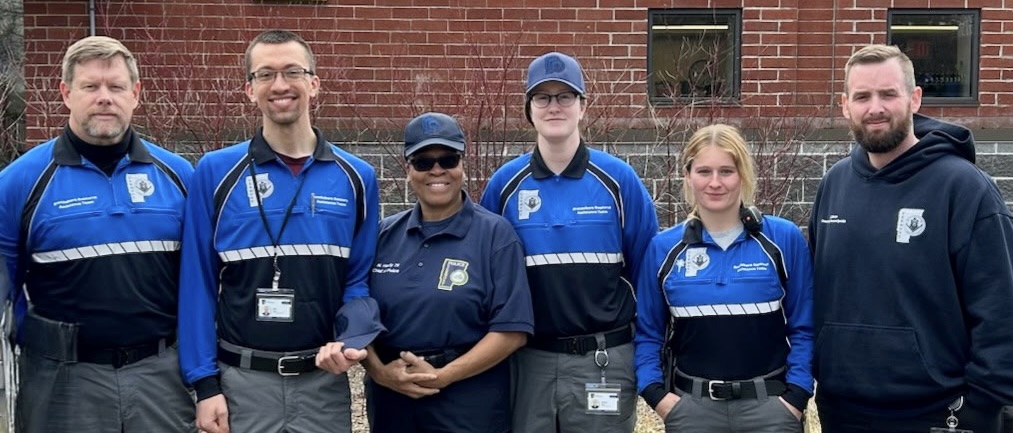-
Police Department
-
Returns & Requests
-
Resources
-
Community Engagement
-
Recruitment
The founding members of B.R.A.T., pictured left to right: Bob Perkins, Sam Stevens, Police Chief Norma Hardy, Marissa Pifer, Chloe Prouty, and Justin Johnston.
B.R.A.T. Unit
The B.R.A.T. (Brattleboro Resource Assistance Team) Unit is a team of uniformed, unarmed personnel that's focused on expanding public safety services to the downtown area, providing greater safety, and an enhanced quality of life. The team developed from a pilot program that the Brattleboro Police Department (BPD) launched in 2022.
Team Members
Justin Johnston, Community Resource Specialist
Bob Perkins
Chloe Prouty
Sam Stevens
Assignments and Training
The B.R.A.T. Unit performs a variety of tasks, including:
• Patrolling the downtown area, providing a visual presence and deterrence to criminal activity and chaos-creating activities.
• Providing escorts to and from parking lots as requested (contact dispatch for this service, 802-257-7946).
• Using de-escalation training to resolve minor situations and/or provide basic, on-scene mediation needs.
• Connecting with businesses in the downtown area to keep informed of changing concerns or successes.
• Taking reports of late-reported property crimes such as larcenies and retail thefts.
• Taking reports of property-damage-only vehicle crashes.
• Directing traffic.
• Assist patrol officers investigating crimes in the downtown area.
• Issuing trespass orders.
• Works in conjunction with other emergency response personnel and outreach teams to further positive relationships in the community.
B.R.A.T. members will be provided with a multi-part training program that includes:
• The BPD-designed VALOR training program, a 120-hour course designed to teach basic information about providing public safety services in Brattleboro, centering on the mission statement and core values of the Police Department.
• Level II training from the Vermont Police Academy, which requires 80 hours of training on-site at the VPA, followed by extensive field training at the Police Department.
• BPD's Field Training and Evaluation Program, which is a minimum of 12 weeks (480 hours). Our FTEP follows a nationally recognized program of learning, training, and oversight that is supported by the VPA.
• Specialized training for the Resource Specialist position.
Community Resource Specialist
The Brattleboro Police Department hired Justin Johnston as a Community Resource Specialist in fall 2024. Justin is a person in long-term recovery from substance use disorder and has been heavily involved with Project C.A.R.E. as a Recovery Coach since the inception of the program in 2018.
Prior to joining B.R.A.T., Justin worked as the Director of Center and Programming at Turning Point of Windham County. He comes to the BPD with considerable training in de-escalation, motivational interviewing, peer support, and trauma-informed care. Justin works in tandem with BPD personnel to support recovery in the community. The Community Resource Specialist's duties include:
- Coordinates with the Project C.A.R.E. outreach team/partners (Probation & Parole, Turning Point, Consolidated Treatment Centers/Methadone Clinic, HCRS, Groundworks, and the Brattleboro Fire Department).
- Proactive outreach aimed at the areas most susceptible to crime and conducts overdose follow-up.
- Identifies top offenders in town and finds ways to reduce the impact on the community.
- Assists with transportation to inpatient and outpatient facilities.
- Responds to some welfare checks related to substance use.
- Meets with people in custody for drug-related offenses and provide resources.
History
In December of 2022, BPD received approval to launch a pilot program, which later developed into the B.R.A.T. Unit. BPD's plan at that time was for the team to consist of trained personnel who could perform a variety of field and administrative work in support of basic police operations while addressing downtown safety concerns.
The pilot program began in April 2023 with the assignment of a Community Resource Specialist. The Community Resource Specialist became a regular fixture downtown, and the department received many positive comments about his presence downtown and interactions with various businesses. The person left the position in July 2023 to attend the Vermont Police Academy and is now a Patrol Officer. BPD hired another Community Resource Specialist and put him in the position until he, too, went to the Police Academy. This pilot program allowed BPD to continue providing its regular services while also allowing sworn officers to put more focus on criminal activity, such as homicides, burglaries, larcenies, and robberies.
In June 2023, after an incident in the Brattleboro Transportation Center, the Selectboard approved a third-party security services contract to supplement police coverage at the Transportation Center, Brooks Memorial Library, the Gibson-Aiken Center, and the Municipal Center. The Selectboard approved the Downtown Safety Action Plan in August 2024, which formalized the B.R.A.T. Unit. The contracted security services concluded, and BPD began the hiring process for members of the new team to create a more permanent presence downtown.
In October 2024, BPD hired a permanent Community Resource Specialist, Justin Johnston, who has extensive training in de-escalation, motivational interviewing, peer support, and trauma-informed care, greatly expanding upon the Community Resource Specialist role as it was initially developed during the early stages of the B.R.A.T. program.


